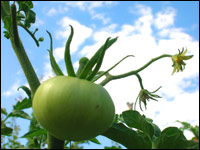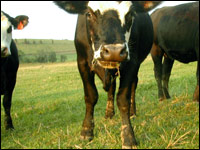agriculture
-
Biotech crops have benefited shareholders in seed giants, but nobody else
A couple of days ago, NY Times writer Andrew Pollack attempted to address the failure of biotech companies to "improve" fruits and vegetable crops -- that is, to bring a genetically altered fruit or vegetable strain (as opposed to grains like corn and legumes like soy) from seed to supermarket.
Unwittingly, the article illustrates the industry's hubris and the mainstream press's gullibility in covering the topic.
Pollack opens thusly:
-
Monsanto’s move into veggie seeds shakes up small organic farmers.
Here at Maverick Farms, a foot-thick blanket of snow swaths the cover crops and garlic beds, insulating them from sub-freezing temperatures. In the depths of the field, a big compost pile smolders. As at small farms all over the country, we've been been flipping through seed catalogs as we plan what to plant this coming season.
At this time of year, optimism burns bright, sparked by the glowing prose of the seed catalogs. Here is my favorite catalog, Fedco, engaging in a bit of beet poetry:
The genius of Alan Kapuler at work, this [root grex beet] is an interbreeding mix of Yellow Intermediate heirloom, Crosby Purple Egyptian heirloom and Lutz Saladleaf heirloom. It absolutely wowed me in my 2004 trial and aroused considerable interest at our Common Ground Fair booth display last fall. The term "grex" is commonly used in orchid breeding. There are 3 distinct colors in this gene pool: a pinkish red with some orange in it, a bright gold and a beautiful iridescent orange. We were impressed by the unusual vigor, glowing colors and length of these gradually tapered elongated roots.
Farmers have to work hard to avoid way overbuying seeds, with tempting descriptions like that dominating the catalogs.
This year, however, a new statement confronts us throughout the Fedco book: "This is the last year we will be offering this Seminis variety." Many venerable varieties bear this unhappy statement. Last year, Monsanto bought Seminis, the world's largest vegetable-seed purveyor, shaking up the small-scale organic farming world. (Here is an analysis of that deal I posted a while back.) Fedco, responding to outrage among its growers, decided to stop buying seeds from Seminis/Monsanto. And that means many varieties people have come to love in their CSA boxes and at the farmers market won't be available for much longer.
-
Two new photo books focus on food
In the valuable new book Fields of Plenty: A Farmer’s Journey in Search of Real Food and the People Who Grow It, author Michael Ableman rambles across the country in a VW van, visiting small-scale farmers to talk with them at the table and in the field. Vine and dandy. Photo: Chrissi Nerantzi. Not surprisingly, […]
-
ADM is doing for soil what Exxon has done to air
Amid all the hoopla over President Bush's State of the Union address, Archer Daniels Midland's quarterly report (PDF), released Tuesday, got little attention outside of Wall Street -- where it drew cheers, sending ADM's share price to an all-time high.
At the company's conference call with analysts, the Wall Street Journal reports, John M. McMillin of Prudential Securities "likened [Archer Daniels Midland] to Exxon Mobil Corp., which just announced its own record-breaking profit and jokingly suggested the company might be called upon to explain its profits."
Actually, McMillin's comparison isn't all that comical. Just as ExxonMobil clawed its way to the top of the corporate heap by peddling an environmentally ruinous commodity whose real costs don't burden its balance sheet, ADM's "blowout" profits can be traced directly to government largesse. Oh yeah, and both companies owe much of their surging profitability to making fuel for cars.
-
Why greens should join forces with gardeners to face down the bull dozers in LA.
Even though I abandoned Brooklyn for the Appalachians, I'm no sentimental pastoralist. I'm a long-term disciple of the great urban theorist (and champion of cities) Jane Jacobs. Human history since the dawn of agriculture 10,000 years ago has been a history of cities. Cities are the future; as David Owen's superb article "Green Manhattan" (PDF) shows, they may be our only hope. The trick is to create agricultural systems within and just outside of cities, minimizing the ruinous effects of long-haul freight transit, slashing the fossil-fuel inputs embedded in food production, maximizing availability of fresh delicious food, and boosting local and even neighborhood economies.
Farmers' markets have been the most visible effort at creating sustainable urban food networks. Equally if not more important, although virtually invisible to well-heeled urban foodies who laudably support farmers' markets, inner-city gardening projects represent a vanguard in the effort to overthrow industrial food and reintroduce sustainably grown, delicious food to populations that were knocked off the land a generation or two ago.
There's been a lot of talk around here about whether or not humanity's future requires messing up Bobby Kennedy Jr.'s ocean view from "the Vineyard." (I say, the hell with him. Mess it up!) This story may be more important, though: An LA developer wants to bulldoze a 14-acre community garden, with 360 family plots, right in the middle of an industrial zone in South Central. The city should be paying these people to do what they're doing, for all the environmental and social benefits they're creating. At the very least, the city should buy the land back from the developer and make the garden permanent.
LA greens, and I know you're out there, get out and man the barricades with those brave gardeners.
-
GM seed manufacturers create conditions that will force their acceptance
This post first appeared on Bitter Greens Journal.
Maverick Farms, where I work, lies on a dirt road halfway up a steep hollow in the Blue Ridge Mountains. Twenty years ago all the land around here was agricultural. Each family generally had a couple of milk cows, a pig or two, and a garden plot to feed themselves; for cash, they planted cabbage (to be sold to a nearby sauerkraut factory, long gone) and tobacco.
All of that has changed. The word "farm" has become a marketing tool to move real estate, and little else. The only other entity with "farm" attached to its name on our road is "Clark's Creek Farm" -- a suburban-style subdivision.
Our area is a magnet for SUV-driving second-home seekers and the real-estate flacks who serve them. Up the road from us, the dirt flies as machines rip into the mountainside to create new lots for fancy homes. Starting at about 7:00 a.m., the rooster's hoarse cry is drowned out by the steady roar of giant trucks careening up the mountain, carrying construction material and machinery.
Nearly everyone up there wants the road to be paved -- it would make construction so much easier, and you could comfortably drive your SUV faster than 20 mph to get up and down the mountain. We say: Hell, no. We're joined in our refusal by two neighbors, people with deep family roots in the area who don't want to see our holler turned into a suburb of Orlando or Charlotte. We refuse to sign the papers that would force the road's paving.
In the end, we will lose and the developers and second-homers will win. They will have forcibly created the logic that makes the road's paving "necessary." Carve enough mini-mansions into the mountainside, cram the road with enough construction trucks and "utility" vehicles, and of course it will have to be paved. It will become a safety issue. The road as it is will have to be condemned; a handsome strip of asphalt will rise up in its place. Progress! And goodbye to our chicken shed and springhouse.
I tell this bitter story to illustrate what's going on with genetically modified (GM) food in Europe. Bear with me.
-
Sustainable-ag legend Joel Salatin can farm — but can he write?
Over the past 20 years, Joel Salatin has emerged as a sort of guru of the sustainable-food movement. His 500-acre Polyface Farm in Swoope, Va., is legendary among a small circle of foodies for its robustly flavored beef, pork, chicken, and eggs. Among farmers, Salatin has won cult status for his innovations in multi-species, pasture-based […]
-
Despite a recent crackdown, Washington State’s raw-milk policy might point way forward.
In a nation riddled with diet-related maladies like obesity and diabetes, the official fear that greets raw milk is impressive.
You can waltz into any convenience store and snap up foods pumped liberally with government-subsidized high-fructose corn sweetener, deep-fried in government-subsidized partially hydrogenated soybean oil. Yet in many states, teams of bureaucrats devote themselves to "protecting" us from raw milk -- and imposing onerous fines on farmers who dare sell it.
Some states ban raw milk outright; others have erected elaborate barriers between farmer and consumer. Here in North Carolina, for example, I have to pretend I'm buying animal fodder when I visit a nearby dairy farm to pick up a gallon or two of raw milk.
Even so, consumers are increasingly demanding it, banding together with farmers to form Prohibition-like cells from New York City to Portland. To me, it tastes better, more alive, than even the best pasteurized milk; and I tend to believe the health claims made for it.
According to this AP article, Washington State is stepping up enforcement of its raw-milk restrictions, which are actually relatively enlightened.
-
The WSJ documents GM contamination
The Wall Street Journal came out with a terrific page-one article documenting "genetic pollution" -- the damage caused when genetically modified crops cross-pollinate with conventional crops.
The article leads with an organic farmer in Spain whose sells his red field corn at a premium to nearby chicken farmers, who prize the product because it "it gives their meat and eggs a rosy color." (I'd be willing to bet that rosy color also translates to higher nutrition content.)
Now the farmer is screwed -- his seeds, carefully bred over time, have become contaminated by GM corn from nearby farms. The rich red color of his corn, like his premium, has vanished into the ether.

